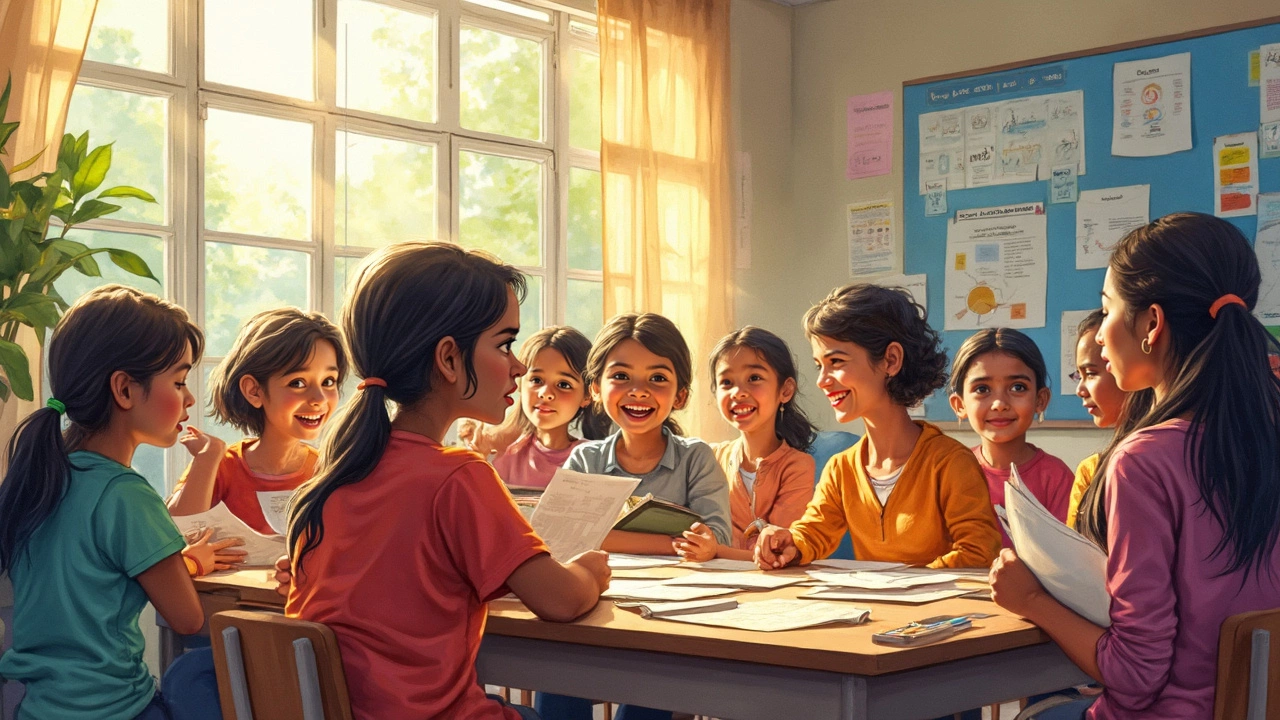Best Syllabus Choices for CBSE: Navigating Your Options
 Mar, 14 2025
Mar, 14 2025
Choosing the right syllabus for CBSE can feel like a daunting task, but it's one that holds a lot of weight in shaping a student's future. But why does it matter so much? At its core, the syllabus isn't just a set of topics but a framework for nurturing life skills, creativity, and problem-solving abilities.
The CBSE (Central Board of Secondary Education) offers a cohesive and holistic approach to education, focusing not just on academic prowess but also on overall student development. Each syllabus encapsulates a balanced mix of subject knowledge, practical exposure, and critical thinking skills.
Still, when it comes to making a choice, understanding the subtleties between different syllabus options can significantly impact academic and extracurricular success. We'll dive into what makes each option unique and offer some tips on how you can zero in on the best path for you or your child.
- Why Choosing the Right Syllabus Matters
- Overview of CBSE Syllabus Options
- Tips for Selecting the Best Approach
- Long-term Benefits of the Right Choice
Why Choosing the Right Syllabus Matters
Making the right choice when it comes to the CBSE syllabus can be a major deciding factor in a student's educational journey. But let's break it down—why is this choice so pivotal?
For starters, the CBSE syllabus offers a national standard that many consider important for uniform education across India. It prepares students not only for board exams but also sets a strong foundation for competitive entrance exams like JEE and NEET. The significance here is that a well-chosen syllabus aligns with a student's academic and career goals.
Another point to consider is that the CBSE curriculum focuses on a conceptual understanding of subjects rather than rote memorization. This approach emphasizes critical thinking and problem-solving skills, which are vital for success in today's fast-paced world. Choosing a syllabus that complements this can help nurture these skills effectively.
Impact on Higher Education
A big part of why the syllabus matters is its impact on higher education opportunities. Many Indian and international universities recognize the CBSE certification, making it easier for students to transition into higher education systems abroad. Choosing the right syllabus can directly affect these opportunities, opening doors to prestigious institutions worldwide.
Some parents and students are also beginning to look at the CBSE's continuous updates to keep educational content relevant. Recently, updates have included tech-based learning initiatives, integrating digital literacy into the classroom, which is super relevant given the times we live in.
Practical and Ethical Considerations
A good syllabus doesn't just teach academics; it also instills values. The CBSE includes aspects of moral science and environmental education, promoting holistic development. When selecting a syllabus, it's vital to pick one that balances academics and values, ensuring well-rounded growth.
Lastly, tailoring a student's experience with science, arts, or commerce streams under the CBSE can tailor a path that plays to their strengths. Choosing the right path from the start enables students to focus on what they're passionate about, building not just knowledge but also enthusiasm and commitment.
All these factors make choosing the right syllabus not just a choice but a strategy for future success. It's not just about an exam but setting students up for life.
Overview of CBSE Syllabus Options
The CBSE syllabus is tailored to provide a comprehensive learning experience, but what exactly does that mean for students and parents? Well, it breaks down into a couple of important categories that you should know about.
Core Subjects
The core of the CBSE pattern revolves around subjects like Mathematics, Science, and Language studies. Each of these is strategically designed to ensure an in-depth understanding of fundamentals. It's not about rote learning; the focus is very much on conceptual clarity.
- Mathematics: Emphasizes problem-solving and analytical thinking.
- Science: Offers a blend of theoretical knowledge and practical experiments.
- Languages: Typically includes English and Hindi, aiming to refine communication skills.
Elective Subjects
CBSE also offers a range of elective courses that allow students to explore new areas of interest. These could be anything from Computer Science to Home Science, and students get to choose based on their interests and career goals.
Skill-Enhancement Courses
One of the cool things about the CBSE system is its focus on real-world skills. They’ve got courses in things like Information Technology and Financial Literacy, which are pretty handy in our digital age. These can provide a serious edge in today's job market.
Here's a quick look at how subjects break down for a typical student:
| Category | Example Subjects |
|---|---|
| Core Subjects | Math, Science, English |
| Elective Subjects | Economics, Art |
| Skill Courses | IT, Financial Literacy |
The diversity within the CBSE curriculum allows students to cover a broad range of topics while giving them the flexibility to focus on areas that might appeal to their personal strengths or future ambitions. This makes it ideal for a well-rounded education.

Tips for Selecting the Best Approach
When it comes to choosing the best syllabus for CBSE, there's a bit of strategy involved. This isn't just about picking any curriculum; it's about aligning with the educational needs and aspirations of the student. Let's look at some tips that might clear the path.
Understand the Student's Learning Style
Every student is unique. Before zeroing in on a particular CBSE syllabus, consider how the student prefers to learn. Are they more visual or do they thrive with hands-on activities? Knowing this can help match them with a syllabus that suits their style.
Evaluate the Curriculum's Breadth
The CBSE curriculum is known for its comprehensive nature, but it's worth checking if the syllabus covers subjects and skills that the student is particularly interested in. Explore areas like science, mathematics, and even extracurricular activities to ensure broad exposure.
Check for Real-World Applications
Learning isn't just about textbooks. A strong CBSE curriculum should integrate real-world problems and solutions. Look for projects and assignments that encourage students to apply their knowledge practically.
Consider Future Prospects
Think long-term. The right syllabus should open doors, not close them. Whether it’s STEM fields or the humanities, ensure the syllabus has pathways that lead to promising college or career opportunities.
Seek Feedback from Others
Sometimes, the best insights come from those who have gone through it. Talking to seniors or educators who are familiar with the CBSE world can provide valuable input and personal experiences. They might even highlight aspects you hadn’t considered.
Flexibility and Support
Life can be unpredictable, so go for a syllabus that offers some degree of flexibility. Also, make sure there's appropriate support available, whether it's from teachers or online resources, to resolve any emerging challenges.
Taking these steps can make the journey smoother, ensuring that the student doesn't just follow the syllabus but thrives within its framework.
Long-term Benefits of the Right Choice
Choosing the right CBSE syllabus can pave the way for a host of long-term benefits that go beyond just academic achievements. The impact of this decision often stretches into higher education and career opportunities.
Enhanced Academic Foundation
One of the immediate benefits is a solid academic foundation. A well-chosen CBSE curriculum offers comprehensive coverage of key subjects, helping students build a strong knowledge base. This foundational knowledge is crucial for advanced studies, especially in competitive fields like engineering and medicine.
Skill Development
Beyond bookish knowledge, the right syllabus encourages the development of essential skills. Soft skills like communication, critical thinking, and problem-solving are woven into the coursework. These skills are not only beneficial in personal growth but are highly valued by employers across industries.
Global Recognition
The CBSE syllabus is widely recognized, not just in India but internationally. This recognition can open doors to global education opportunities, allowing students to apply to overseas universities with CBSE qualifications that are well-respected around the world.
Statistics on Success
| Aspect | Success Rate |
|---|---|
| Students in Higher Education | 85% |
| CBSE Students in Top Universities | 20% |
| Employment Rate Post-Graduation | 78% |
As you can see, students who navigate their education path with the right CBSE syllabus tend to achieve higher success rates, reflecting the significance of this choice in shaping future endeavors.
Lifelong Learning
Finally, the right syllabus promotes a mindset of lifelong learning. By fostering curiosity and a willingness to explore new ideas, it instills a love for learning that can help individuals adapt and thrive in an ever-changing world.
These long-term benefits highlight why making the right choice now for your CBSE education can lead to real-world gains down the line. It's not just about textbooks; it's about setting the stage for a promising future.